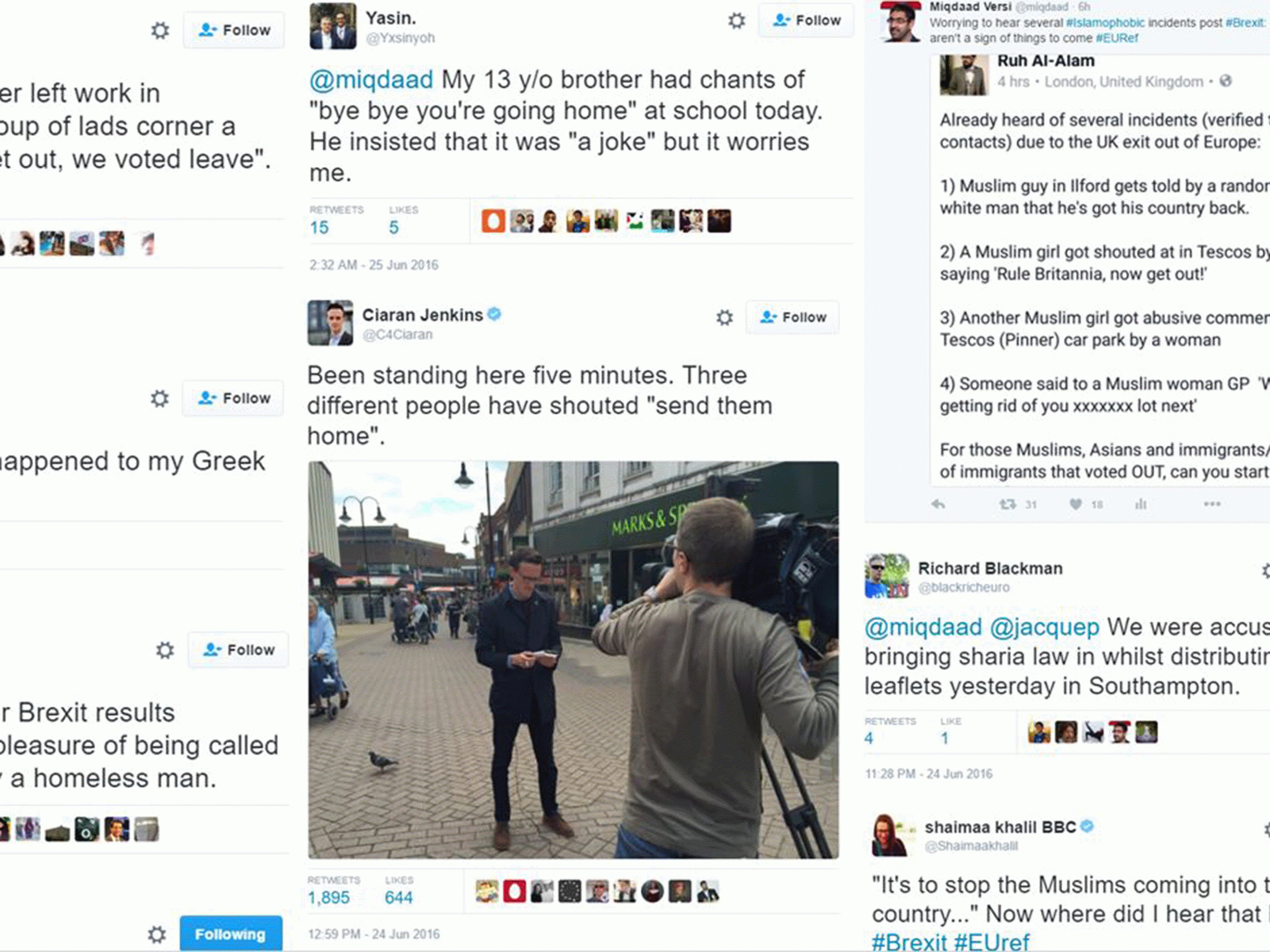Brexit: BBC journalist called a 'p**i' as Muslim Council warns of rising Islamophobia
'They went out of their way to play on the hatred and fear that people have about what's going on in the Middle East', researchers have said
Your support helps us to tell the story
From reproductive rights to climate change to Big Tech, The Independent is on the ground when the story is developing. Whether it's investigating the financials of Elon Musk's pro-Trump PAC or producing our latest documentary, 'The A Word', which shines a light on the American women fighting for reproductive rights, we know how important it is to parse out the facts from the messaging.
At such a critical moment in US history, we need reporters on the ground. Your donation allows us to keep sending journalists to speak to both sides of the story.
The Independent is trusted by Americans across the entire political spectrum. And unlike many other quality news outlets, we choose not to lock Americans out of our reporting and analysis with paywalls. We believe quality journalism should be available to everyone, paid for by those who can afford it.
Your support makes all the difference.A BBC journalist has been called a racially abusive term she had "not heard since the 80s" as reseachers warned the EU campaigns have "stoked" Islamophobia in Britain.
Sima Kotecha, who is a reporter for Radio Four, expressed her shock after being called a "p**i" in her home town of Basingstoke in the immediate aftermath of the Brexit vote.
"In utter shock: just been called p**i in my home town! Haven't heard that word here since the 80s...!" she wrote.
She added several hours later that the outpouring of support from many members of the public in response had made her "SO proud to be British".
Her words came as the Muslim Council of Britain (MCB) brought together many cases of racial and xenophobic abuse against all those who were seemingly not "English" on social media.
Politicians in both the Leave and Remain camps have prompted anti-refugee sentiment which is being felt post-Brexit, researchers at the MCB said.
Miqdaad Versi, the assistant secretary general at the MCB, said that he believed most people were against hate crime, but the language used by many politicians had fuelled fear of Muslims.
He said David Cameron's "swarm of migrant" comments were racially inflammatory, while the Leave campaign's messaging over Turkey's accession to EU membership was directly designed to provoke fear of Islamists.
"There has been a simmering of anti-Muslim feeling for a long time, and this has been stoked by the campaigns on the EU," Mr Versi told The Independent.
"The leaflets and attitude of the Leave campaign to Turkey said that Syria and Iraq also wanted to join the EU.
"They went out of their way to play on the hatred and fear that people have about what's going on in the Middle East."
Turkey is in negotiations to join the EU, in return for holding onto refugees that many countries in Europe such as Britain do not want to accept.
When Channel Four interviewed members of the public last week about why they had voted for Brexit, several told the broadcaster: "To keep the Muslims out".
Britain is already outside the Schengen zone of free movement, and the current government will also not take any of the refugees - some of whom lawyers say have legitimate asylum claims in the UK - waiting in Dunkirk and Calais camps.
Just 105 of the abusive messages found by the MCB were compiled into a "collage" which prompted a reaction on Twitter as people expressed their disgust.

Mr Versi said that Islamophobia had not been taken seriously by politicians for some time, with funding for security in mosques not granted where it has been granted to other places of worship.
He called for "clear political leadership" to "heal the divisions" highlighted by the EU campaigns.
Sadiq Khan, who himself was accused of extremist sympathies by the Conservative Party while campaigning to be Mayor of London, has met with the Metropolitan Police over the rise in racially-aggravated verbal abuse.
Boris Johnson, the major leader in the Brexit camp, has denied that immigration was the driving force behind rejecting the EU, saying that it was about "regaining control".

Join our commenting forum
Join thought-provoking conversations, follow other Independent readers and see their replies
Comments